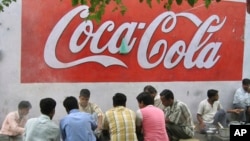Traders angry at a U.S.-based animal rights group have turned their ire on two iconic American brands, pulling Coke and Pepsi from shelves in the south Indian state of Tamil Nadu.
The Tamil Nadu Traders Association said the soft-drink makers were draining too much water in the state but that they targeted the American brands because PETA had pushed the 2014 ban on the popular local tradition of bull-taming.
The trading association said its ban that went into effect late Wednesday was supported by more than 1.5 million local shop owners and beverage sellers in Tamil Nadu.
In a separate case, a court Thursday lifted restrictions on water supplies to Coke and Pepsi factories in the drought-prone state.
In January, Tamil Nadu was rocked by protests by tens of thousands of people demanding that the ban on bull-taming, or jallikattu, be lifted. The government rushed new legislation exempting the tradition from animal cruelty laws.
During the protests, thousands of young people turned their anger against the People for the Ethical Treatment of Animals to other American multinational companies and vowed to shun sodas made by them. Traders pledged that they would not sell colas and would instead stock locally made soft drinks or coconut water.
“On March 1, following a campaign among traders and the public against foreign brands, we implemented the decision of our association members to sell only domestic brands of beverages,” said A. M. Vikrama Raja, president of the trade group.
In the court case, the Madras High Court announced that it was removing restrictions on the supply of water to Coca-Cola and PepsiCo's factories in Tamil Nadu.
In November, the court had barred the two companies from using local water supplies after farmers complained about water shortages in the state's Thamirabarani River.
In Chennai, the state capital, traders said the ban on Coke and Pepsi was rooted in people's anger against PETA.
“How can we forget that it's because of PETA that jallikattu was banned by the Supreme Court?” Arumugham Desigan, district secretary of the traders association, said Thursday.
He said the association has appealed to local restaurants and hotels to stop serving Coke and Pepsi and offer locally made fruit drinks instead.
The weeks-long protests to resume the bull-taming ritual became a fight for Tamil identity, with many people viewing its ban as an assault on Tamil Nadu's customs and traditions.
Meanwhile, the Indian Beverage Association that represents almost all leading soft-drink manufacturers in India, said it was “deeply disappointed” with the call for the ban, terming it “anti-consumer and anti-competition.”
Coca-Cola referred to the IBA statement and declined to comment further on the ban. The IBA said the ban was “was against the proven fundamentals of robust economic growth.”
“Coca-Cola and PepsiCo India together provide direct employment to 2,000 families in Tamil Nadu and more than 5,000 families indirectly, through their extensive supply chain,” the IBA said in a statement.
The association said it hoped “good sense will prevail and that consumers will continue to have the right to exercise their choice in Tamil Nadu.”








